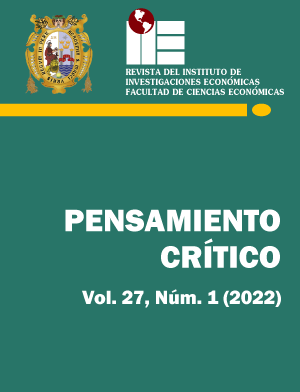Cost of sovereign default
Theory and empirical evidence
DOI:
https://doi.org/10.15381/pc.v27i1.23280Keywords:
credit risk, sovereign risk, probability of default, external public debt; credit spread, moratorium, restructuring, banking crisis, credit crisis, index of market pressureAbstract
In this scientific article, the issue of the economic costs that a country assumes by failing to service the public debt, specifically the external public debt, will be addressed. The main costs, on which there is consensus in the literature, are the following: on the economic growth; on the reputation of the sovereign, which generally implies a significant decrease in its international credit ratings and an increase in its financing costs measured by the sovereign credit spread; in international trade they are associated with the greater difficulty that the country's companies have in accessing international bank credit for their commercial operations; Finally, if we consider the impact on the holders of the domestic public debt of a sovereign default event, whose key economic agent is the financial system, then the possibility of a banking crisis or a credit crunch must be considered as a worthy special case. Each of these costs is evaluated with a representative study of the empirical literature, and complemented with other studies, presenting their results. The article ends with the main conclusions drawn from the studies under review, with a personal appreciation and bibliographical references.
Downloads
Published
Issue
Section
License
Copyright (c) 2022 Ezequiel Fernando Ramírez Daza

This work is licensed under a Creative Commons Attribution-NonCommercial-ShareAlike 4.0 International License.
THE AUTHORS RETAIN THEIR RIGHTS:
a. The authors retain their trademark and patent rights, and also on any process or procedure described in the article.
b. The authors retain the right to share, copy, distribute, execute and publicly communicate the article published in Pensamiento Crítico (for example, place it in an institutional repository or publish it in a book), with recognition of its initial publication in Pensamiento Crítico.
c. The authors retain the right to make a subsequent publication of their work, to use the article or any part of it (for example: a compilation of their works, notes for conferences, thesis, or for a book), provided they indicate the source of publication (authors of the work, journal, volume, number and date).















